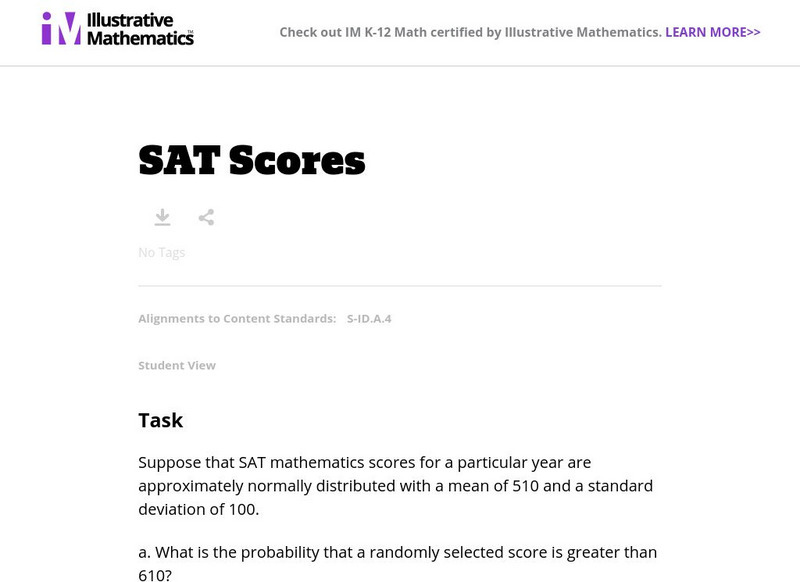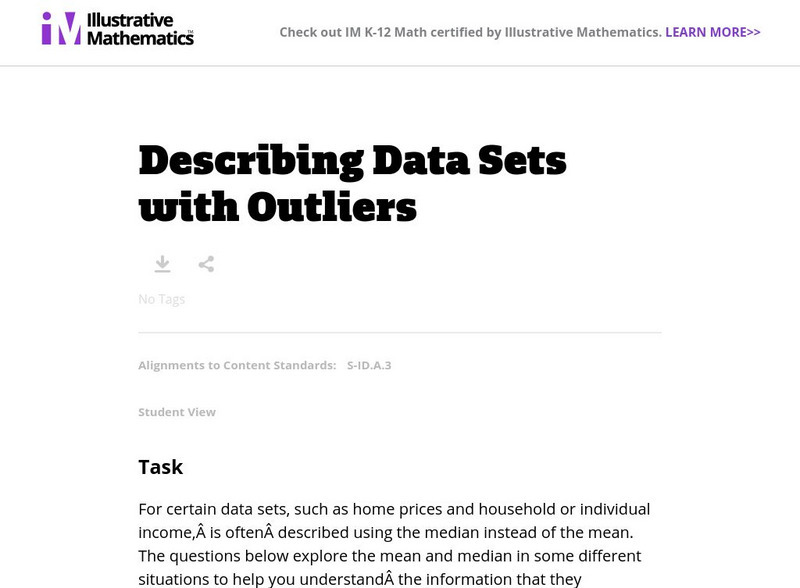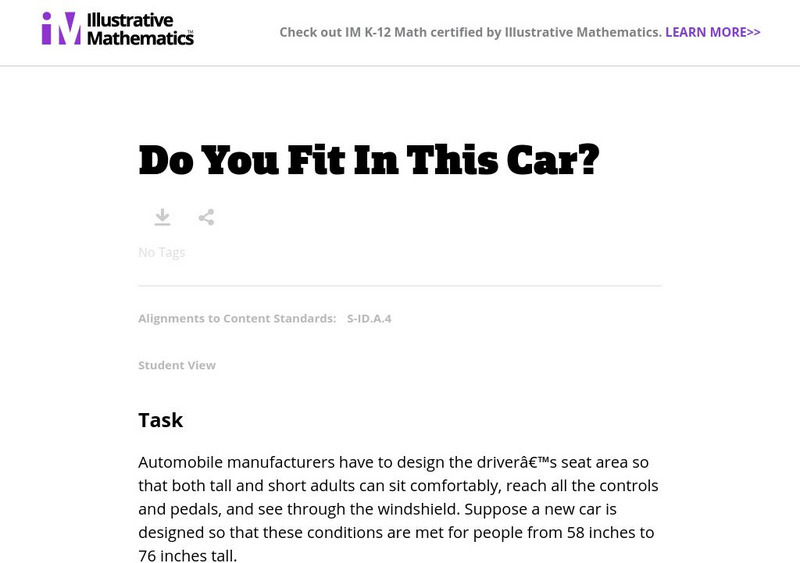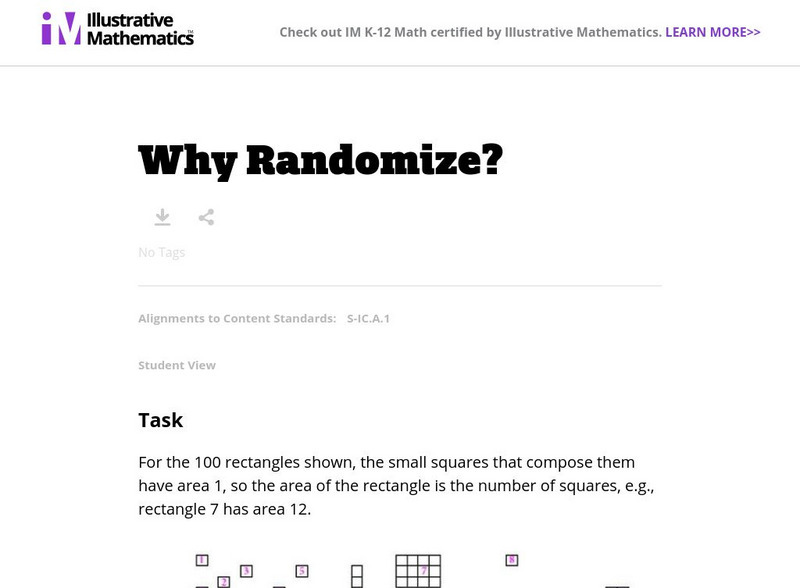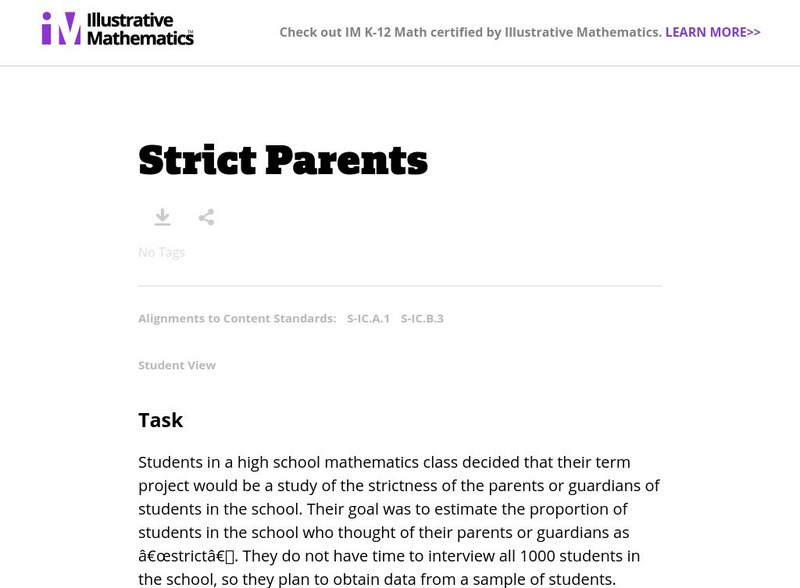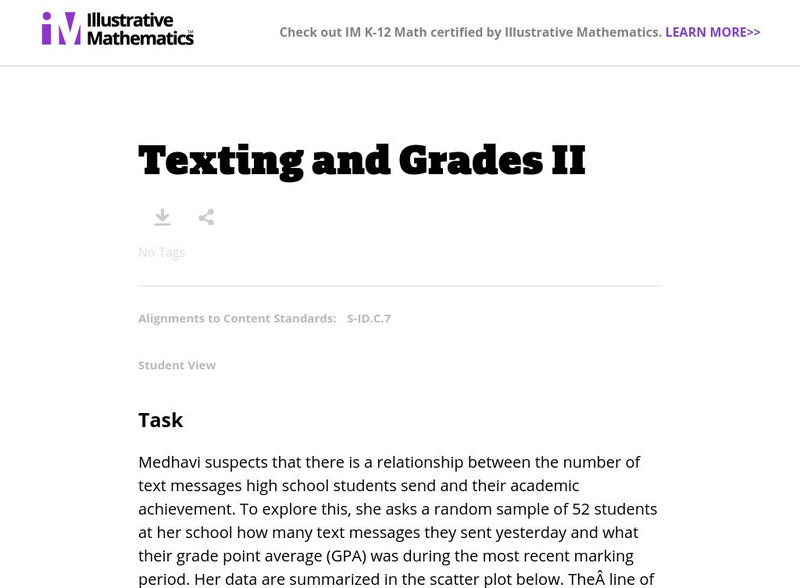Hi, what do you want to do?
Illustrative Mathematics
Illustrative Mathematics: S Id Sat Scores
Students will find solutions for a series of questions based on the assumption that SAT mathematics scores for a particular year are approximately normally distributed with a mean of 510 and a standard deviation of 100. Explanation and...
Illustrative Mathematics
Illustrative Mathematics: Understanding the Standard Deviation
The purpose of this task is to deepen student understanding of the standard deviation as a measure of variability in data distribution. The task is divided into four parts, each of which asks learners to think about standard deviation in...
Illustrative Mathematics
Illustrative Mathematics: S Id.3 Describing Data Sets With Outliers
For certain data sets, such as home prices and household or individual income, is often described using the median instead of the mean. This lesson explores the mean and median in some different situations to help you understand the...
Illustrative Mathematics
Illustrative Mathematics: S Id Math Test Grades
Ari has collected data on how much her classmates study each week and how well they did on their recent math test. Here is part of the data showing the percentage of each group (divided according to hours spent studying) who got B's or...
Illustrative Mathematics
Illustrative Mathematics: S Id.1,2,3 Speed Trap
A statistically-minded state trooper wondered if the speed distributions are similar for cars traveling northbound and for cars traveling southbound on an isolated stretch of interstate highway. Learners will use the data collected by...
Illustrative Mathematics
Illustrative Mathematics: S Id.4 Do You Fit in This Car?
Students are tasked with solving a common issue for automobile manufacturers that require the students to use normal distribution as a model for data distribution. They will also use mean and standard deviation to figure out the problem....
Illustrative Mathematics
Illustrative Mathematics: S cp.b.9: Random Walk Iii
The task provides a context of "random walking" to calculate discrete probabilities and represent them on a bar graph. Aligns with S-CP.B.9.
Illustrative Mathematics
Illustrative Mathematics: S Id.6 Used Subaru Foresters
Help Jane sell her Forrester! Using the data given, students will make an appropriate plot with well-labeled axes that would allow you to see if there is a relationship between price and age and between price and mileage. Students are...
Illustrative Mathematics
Illustrative Mathematics: S Id.7 Used Subaru Foresters
Jane wants to sell her Subaru Forester and does research online to find other cars for sale in her area. She examines the scatterplot of price versus age and determines that a linear model is appropriate. Answer a variety of questions...
Illustrative Mathematics
Illustrative Mathematics: S Id Golf and Divorce
This is a simple task addressing the distinction between correlation and causation. Students are given information indicating a correlation between two variables and are asked to reason out whether or not a causation can be inferred.
Illustrative Mathematics
Illustrative Mathematics: S Ic Why Randomize?
The exercise demonstrates that judgment (non-random) samples tend to be biased in the sense that they produce samples that are not balanced with respect to the population characteristics of interest. Students will estimate the mean...
Illustrative Mathematics
Illustrative Mathematics: S Id, F if Laptop Battery Charge
This task uses a situation that is familiar to students to solve a problem they probably have all encountered before: How long will it take until an electronic device has a fully charged battery? Given data, students perform a variety of...
Illustrative Mathematics
Illustrative Mathematics: S Id.6a,7 Olympic Men's 100 Meter Dash
This task asks students to identify when two quantitative variables show evidence of a linear association and to describe the strength and direction of that association. Students will use a scatterplot showing the finishing times for the...
Illustrative Mathematics
Illustrative Mathematics: S Ic Strict Parents
In this task, students want to estimate the proportion of students in the school who thought of their parents as "strict". They do not have time to interview all 1000 students, so they plan to obtain data from a sample of students....
Illustrative Mathematics
Illustrative Mathematics: S Id.4 Should We Send Out a Certificate?
Should Fred receive a certificate for scoring in the top 2.5% of a statewide standardized test? Given the test scores for a large population and the mean and standard deviation, students will decide if Fred's score is good enough....
Illustrative Mathematics
Illustrative Mathematics: S Id.7 Texting and Grades
Medhavi suspects that there is a relationship between the number of text messages high school young scholars send and their academic achievement. To explore this, she asks a random sample of 52 students at her school how many text...
Illustrative Mathematics
Illustrative Mathematics: S Md.2 Bob's Bagel Shop
The purpose of this task is to assess a student's ability to compute and interpret an expected value. Notice that interpreting expected value requires thinking in terms of a long-run average. Learners will help Bob the bagel man find the...
Illustrative Mathematics
Illustrative Mathematics: 7.sp Rolling Twice
A fair six-sided die is rolled twice. What is the theoretical probability that the first number that comes up is greater than or equal to the second number? Aligns with 7.SP.C.8.
Illustrative Mathematics
Illustrative Mathematics: 7.sp Sitting Across From Each Other
Angie, Bridget, Carlos, and Diego are seated at random around a square table, one person to a side. What is the theoretical probability that Angie and Carlos are seated opposite each other? Aligns with 7.SP.C.8.a.
Illustrative Mathematics
Illustrative Mathematics: 7.sp Election Poll, Variation 3
Members of the seventh grade math group have nominated a member of their group for class president. Every student in seventh grade will cast a vote. There are only 2 candidates in the race, so a candidate must receive at least 50% of the...
Illustrative Mathematics
Illustrative Mathematics: 7.sp Waiting Times
Suppose each box of a popular brand of cereal contains a pen as a prize. The pens come in four colors, blue, red, green and yellow. Each color of pen is equally likely to appear in any box of cereal. Design and carry out a simulation to...
Illustrative Mathematics
Illustrative Mathematics: 7.sp Estimating the Mean State Area
The table below gives the areas (in thousands of square miles) for each of the lower 48 states. This serves as the population for this study. Your task involves taking small samples from this population and using the sample mean to...
Illustrative Mathematics
Illustrative Mathematics: 7.sp Election Poll, Variation 1
Members of the seventh grade math group have nominated a member of their group to be class president. Every student in seventh grade will cast a vote. There are 2 candidates in the race and a candidate needs at least 50% of the votes to...
Illustrative Mathematics
Illustrative Mathematics: 7.sp Stay or Switch?
You are playing a video game. At the end of every level, there are three boxes. One contains 10,000 points, and the other two are empty. You are allowed to choose one of the boxes, but before the one you choose opens, one of the other...





